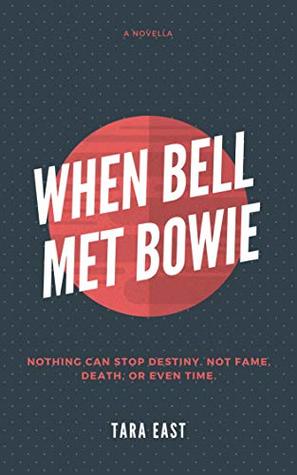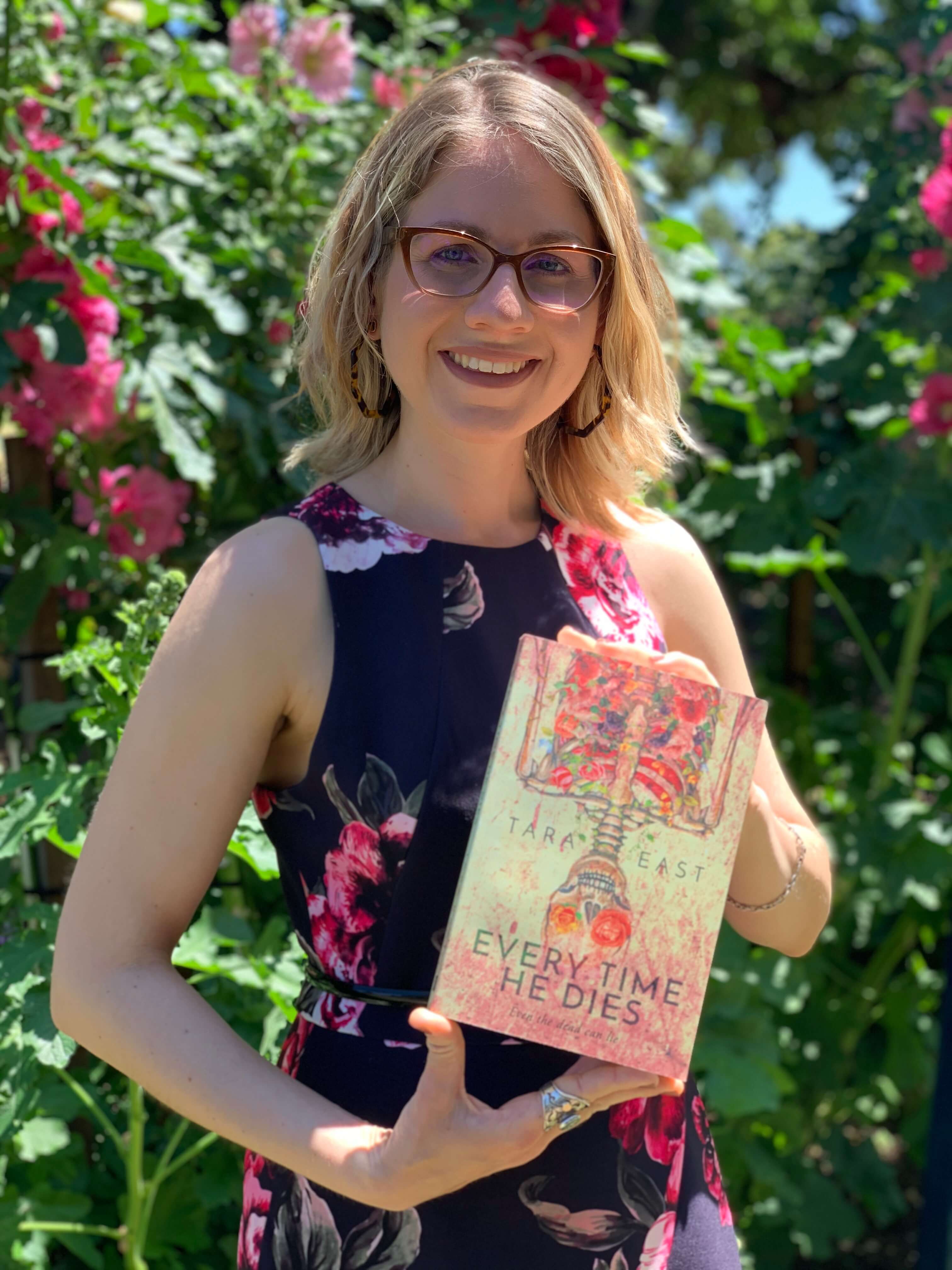

Tara East is a writer, blogger, youtuber, academic and much more! Highly educated, with a Bachelor in Journalism, a Graduate Certificate in Editing and Publishing, a Masters of Professional Practice Creative Writing, a Bachelor of Arts (Honours) in Creative and Critical Writing, she is currently completing her Doctorate in Creative Writing. She gave me the opportunity to read her novella involving time travel, When Bell met Bowie, and it was quite a thoughtful read. See my review here.
It was wonderful to connect with her later about the book and more! Enjoy the interview, and get some insights about the book, with questions that have any spoilers, available only by magic! 🙂
- What gave you the idea of this book? What experiences in your education and professional life helped you pursue this idea?
To be totally honest, the idea for the novella came about while I was standing in a stationery store with my best friend, Sam. I knew that I wanted to write a science fiction story that explored ideas around gender and the body, and I’ve always been fascinated by time as a subject, theme and literary device.
My friend and I were brainstorming potential plot ideas when Bowie’s Suffragette City came on. Now, full credit to Sam as she grabbed my arm and said, “David Bowie is Bell’s dad! She should travel back in time to meet him!” And that’s where the premise for the story came from.
In terms of my professional experience and education, I have four degrees in communication and a background in journalism, copywriting and editing. My professional life has taught me how to write copy fast, how to not take feedback personally and that any piece of writing can be reduced and revised for clarity. These are all useful skills to have as a writer, but they are especially useful when writing nonfiction.
Conversely, my education has taught me how to slow down by carefully considering each line and being intentional with my words. I learnt how to critically analyse my own work and to ask challenging questions such as does this sentence move the plot forward? What is this story really about? Does this scene serve the plot, or am I just showing off?
When Bell Met Bowie was written as part of my Honours program last year. This was the first time I was exposed to critical theory and the creative work was deeply informed by feminist scholars Donna Haraway and Elizabeth Grosz and queer theorist José Esteban Muñoz. I thoroughly enjoyed the creative challenge of writing through these respective lenses which benefited the work as it added a layer of depth I could not have achieved otherwise. (If interested you can read an adapted version of my thesis here. )
- Are you a Bowie fan? Which of his songs is your favourite?
I know this seems strange, but I actually wasn’t. However, Bowie’s androgynous persona suited the needs of the narrative perfectly! In order to write this story, I had to do a lot of research. That included watching and reading interviews, biographies, and of course, listening to Bowie’s music. As a result, I can say that some of my favourite songs are: Sorrow, Oh You Pretty Things, Golden Years and Diamon Dogs.
- What made you curious about the ayahuasca ceremony? Are there similar ceremonies in other cultures that you could have used for this book?
I wanted Bell’s time travel experience to be ambiguous, so I figured a psychedelic experience would be one of the best ways to achieve that. However, Bell is actually quite straight-laced and she isn’t the type of girl to take an illicit drug, so having her consume a natural hallucinogenic seemed like the most plausible solution. I have never been apart of an ayahuasca ceremony, but I have several friends who have and their experiences were invaluable to the writing of the novella.
I am aware that Fijians have a similar ceremony, as do Native Americans. Don’t quote me on it, but most indigenous cultures have some version of a sacred ceremony that involves heightened states of consciousness either through the consumption of native roots, brews, meditation or some other catalyst.
- Do you plan on writing any follow up stories featuring Bell and Brownyn?
A few readers have encouraged me to transform the novella (currently 10, 000 words) into a full-length novel. However, I feel that I was able to express Bell’s story and achieve my own goals as a writer within the confines of a novella-length story. For me, the story feels complete and I am happy with how it currently stands.
- If there was one thing that you would like your readers to take away from When Bell met Bowie, what would it be?
That our bodies contain more wisdom then we give them credit for. If we can silence the chattering of our monkey mind for long enough and tune into our gut, our inner ‘knowing’, then we gain insight into knowledge and insight that cannot be accessed through the logical mind. It is easy to live in denial and to conceal the truth from ourselves, but the body knows truth.
- How is When Bell met Bowie different from your other works?
It is so different. Most of my other short works draw upon horror, speculative and supernatural tropes, but this novella was my first foray into science fiction. In terms of longer works, my debut novel, Every Time He Dies, could be described as a soft-boiled crime novel with paranormal elements, but it’s probably easier to say that it’s speculative fiction.
As you can see, most of my works draw upon multiple genres, but it was the explicit use of time as a narrative device within When Bell Met Bowie that differs this story from my other works.
I usually don’t ask questions that can spoil a book but this time I could not resist. Feel free to skip this section! 🙂
[showhide more_text=”Show Q&A that contain curiosities about the book plot” less_text=”Hide Q&A”]
- Why did you choose to introduce other versions of Bell towards the end of the story?
Doppelgangers are a common trope within time travel narratives and I wanted to pay homage to this tradition. Of course, it also plays into the idea of ‘everything happening at once’ and ‘parallel’ time/lives. It also circles back to my response to question five in regards to the body as the older version of Bell has all this knowledge that the younger Bell doesn’t. The two Bell’s share the same personality and same body, and yet they are also different. For me, this raised interesting question around how time and the body informs our identity.
- Bell communicates with her younger and older selves through letters. Why was this connection important to her? As a single child brought up by a single mother, could one have attributed this to an active imagination?
This exchange could absolutely be attributed to an active imagination, again, I wanted the exchange between the younger and older Bell to be ambiguous. These exchanges were such a fun way to play with time and the idea of predestination. Did Bell travel back in time because she actually wanted to or because the events were predecided? Is Bell a free agent or a victim of fate?
The narrative doesn’t offer any explicit answers, but that was the point. Sometimes the questions are more interesting than the answers.
[/showhide]
- How do you select the names of your characters? Are they just names that appeal to you, did you look them up for a special meaning?
I do wish that I had a better answer to this question, but to be honest I suck at naming characters. I knew that I wanted the mother’s and daughter’s first name to start with ‘B’ to create a tiny connection to Bowie. Brownyn was named after a friend of mine and Bell was literally the first female name I thought of that started with a ‘B’.
I probably could have lied and come up with a more meaningful answer, but it’s important that writers be honest about their process so that we can learn from one another and in this instance, the character names did not have special meanings.
- What would you tell your younger self when it comes to writing?
It will take longer than you want to reach your goals, but it’s so important that you start now because that time will pass anyway. Start now. Right now. Give yourself permission to write as much as you want. And remember this: the process is more rewarding than the outcome; writing really is the reward.

Thanks for reading my Q&A with Tara. I posted about her book, When Bell met Bowie, already. Her newest book, Every time he dies is available starting today! Check out the synopsisi below and navigate to this paranormal crime thriller on Amazon!
Daphne Lawrence is haunted. Two years ago, her fiancée died in a terrible accident, her mother passed away from cancer and she stopped speaking to her father. As an embalmer, Daff is used to the company of dead people, but she isn’t used to them talking back. In fact, Daff isn’t used to anything that could be considered woo-woo including, but not limited to: psychics, crystal, meditation, tarot cards, vision quests and coincidences. Too bad that’s everything she’s experiencing.
Daff is forced to confront her own long ignored grief when she discovers a haunted watch buried in the sand at Golden Beach. The problem is, her ghost has no memory of his former life or how he died.
As Daff seeks to discover the spectre’s identity, dangerous truths and hidden secrets are revealed. Soon, she finds herself in the middle of an on-going homicide investigation led by Detective Sergeant Jon Lawrence, her father. A story about grief, time and identity, Every Time He Dies will leave you wondering whether our dearly beloveds ever really depart.
** Every time he dies is now out in stores so get a copy and let me know what you think! I’m looking forward to reading it in the future! **
Amazon Kindle
Amazon Paperback
Cover image: Photo by The Creative Exchange on Unsplash

Be First to Comment